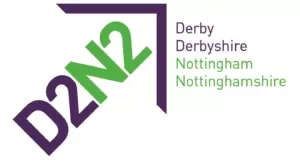Free Grant Funded Digital Skills Bootcamps in Greater Lincolnshire & Rutland
16-day Skills Bootcamp in Digital Marketing for Greater Lincolnshire & Rutland learners
Free for job-seekers & self-employed (employers pay 10-30%)
Apply now for grant-funded skills bootcamps in digital marketing, for learners & employers based in Greater Lincolnshire & Rutland
Please note: we are currently awaiting the Government and Department for Education decision on the next round of funding for the 2025-26 financial year. Once we have received these details we will update this page accordingly.
In the meantime, please complete our waiting list form and we will keep you updated with the latest news and prioritise you for applications.
Read on to find out more about the course itself, leading to a Level 5 qualification from the Digital Marketing Institute (DMI).
Proven track record with over 1000 learners enrolled since January 2022:
Anicca Academy is the Training Division of Anicca Digital, a renowned digital marketing agency that has provided digital marketing services and client training for over 18 years.
Since January 2022, Anicca Academy has delivered 29 bootcamps and enrolled over 1000 learners based in the East Midlands & New Anglia, to boost their career or business with new skills in digital marketing.
You can check out our credentials on Companies House or the Government’s Register of Training Providers, by using our registration number UKPRN: 10054420.
Practical skills in essential digital marketing channels:
Our Skills BootCamp in digital marketing is based on the syllabus and content from the DMI Level 5 Professional Diploma in Digital Marketing. The 10 modules cover the theory and practical skills required across a wide range of digital marketing channels, with a whole day dedicated to each of these topics:
- Introduction to Digital Marketing
- Social Media Marketing
- Content Marketing
- Paid Media and Display Advertising
- Measurement and Analytics
- Email Marketing
- Search Engine Optimisation
- Web Optimisation
- Developing Your Marketing Strategy
- Professional Skills
Inclusive learning leading to a Level 5 qualification from the Digital Marketing Institute (DMI):
ore digital marketing activities, developing new skills that will enhance your career prospects or help your business grow.
Anicca’s bootcamp stands out as the only Level 5 Skills Bootcamp in Digital Marketing in the UK, as we offer the option of taking the Digital Marketing Institute (DMI) Qualification – Professional Diploma in Digital Marketing.
Skills and career support for all types of learners:
On completion of the 16-day course, all job-seekers are guaranteed a job interview.
We also provide self-employed and employer-supported learners with business or career support, including completing an Action Plan, to help learners apply their learning to grow their business, and/or enhance their career.
Grant-funded places:
Job-seekers and self-employed get the course for free, whereas employers that support their staff, pay a small contribution of 10-30% towards the course fee – see more details below.
Skills Bootcamps are based on location, and we are recruiting now for learners who live or work in several areas. We are also recruiting for Skills Bootcamps in the areas below:
- Greater Lincolnshire & Rutland – You are on the right page
- Norfolk & Suffolk
- Leicestershire
- Nottinghamshire & Derbyshire
What to expect during Anicca’s 16-day Skills Bootcamp
CRO & User Experience
Anicca’s bootcamp is designed to deliver over 100 hours of guided learning hours (GLHs) over 16 days, including live online lessons, webinars, practical workshops, and access to Anicca’s extensive digital marketing resources. This includes:
- Half-day induction at the start of the course.
- 10 core lessons covering the DMI modules – the lessons are taught and streamed live online. These interactive classes run from 9:30-4:30 with breaks and must be watched live on the day of the broadcast.
Note: Two of the modules are too long to run in one day – so we have split the course with the final 3 hours of the session being taught on a morning of the same week (10:00am – 1:00pm). - 1-hour live webinars every Friday (9:00-10:00am)
- We also run up to 8 half-day practical workshops (2-3 hours), taught live in the morning or afternoon. These practical workshops are on subjects like Google Analytics (GA4), use of Canva, ChatGPT, writing a press release, writing for SEO, and setting up paid ads etc.
- In total, you have to attend 100 GLHs with around 20 hours of optional webinars and workshops. Of these, at least 80% have to be watched live on the day of broadcast, however, if you are sick or on leave, you can watch the video on catchup, as long as you inform us in advance.
Additional resources:
- The lessons are taught by Anicca’s technical team, i.e. practising agency professionals, with a wealth of industry experience. They can share this experience, show you live examples and demonstrate the tools and techniques we use when managing our clients’ campaigns.
- The video recordings can also be watched later, for example, to help you revise for your exams, or if you are sick or on holiday.
- Learners can also access our learning portal with over 300 PowerPoint slides, student handbooks, videos and around 80 practical activities.
- Ongoing communication and support is via our WhatsApp group, enabling communications with other learners and the trainers.
Help for job-seekers
- If you are a job-seeker, you are GUARANTEED AN INTERVIEW for a job or apprenticeship, as part of this programme. This is particularly useful for learners that are unemployed, recent graduates, or working part-time and want to switch careers.
- Our Employer Liaison Officers (ELO’s) will help individual learners to get ready to apply for jobs with CV and interview preparation, and they will proactively look for jobs for you.
- This includes optional and practical “recruitment-ready workshops” designed to help you develop your CV, and interview techniques.
- We periodically organise workshops from local Universities and colleges on education and apprenticeship opportunities.
Help for self-employed and employed learners
We also provide action planning workshops to help you grow your business, expand your current role, find a new position, or get a new job, with your current employer.
At the end of the course – DMI exams and certification
You can attend our 1-day of guided exam revision, once you have completed the 10 days of core lessons, and the extra workshops.
You will then need to provide evidence of “positive outcomes”, ie. a job interview or your Action plan. Then you will get:
- An Anicca’s certificate of attendance
- 6 months membership to the DMI and access to their free resources, plus a free exam voucher to take your Level 5 DMI qualification. This is an independently verified multiple-choice exam that you take online.
- Guidance on how to take additional exams like the Google Analytics or Google Ads certifications.
Working with Employers
We want to hear from any employers that have staff that would benefit from the course, or that may be interested in offering our learners a job interview or career opportunity.
You can find out more about our free trainee placement and recruitment service for employers.
Further details on grants, funding and payments
The funding is from the Department of Education (DfE); as part of the Lifetime Skills Guarantee and Plan for Jobs.
Individual learners get the course for free, but employers supporting their staff on the course will get a 70-90% grant. Here is a breakdown of the details for the 3 different types of learners:
a) Job-seekers i.e. learners looking for a job or an apprenticeship – Free place
- Job-seekers and career switchers get a FREE place, as they will receive 100% grant funding for the course and the cost of the DMI exam.
- This includes the following groups:
- Unemployed
- Recent graduates
- Working part-time or on zero-hours contracts
- Recently lost employment or income
- Want to return to work following redundancy, health issues, childcare etc.
- Working full-time in a job that has no career prospects, or where the employer would not support the course (career-switcher).
However, you must be able to start work as soon as the course is complete and provide evidence of any interviews or job offers, either organised by yourself, or by our Employment Liaison Officers (ELO’s), as part of our obligation to provide a guaranteed job interview to all job-seekers.
Note: There are other eligibility criteria that apply, these are outlined in the section below.
b) Self-employed learners or sole traders – Free place
Self-employed learners can also join the programme for FREE. However, you will need to complete an Action Plan and provide evidence of how you have applied your learnings to grow your business.
c) Employer-supported learners – Employers contribute 10-30%*
Depending on the company size, employers are required to contribute 10-30% towards the cost of the Skills Bootcamp, in order for their staff to attend the course. Below are the details for both learners and their employers:
- Information for Learners who are currently employed and supported by their employer
Employees that wish to improve their career and prospects within their current company, will need to get permission from their manager to participate in the course. This is because their employer must pay a contribution towards the cost of the training and will be required to sign a contract agreeing to the terms of the grant (see below).
- Information for employers, who have staff they want to train
Employers will receive up to a 90% grant towards the cost of the course and the DMI exam. Their contribution depends on your location and number of employees:
Greater Lincolnshire & Rutland SME businesses with less than 250 employees only pay 10% contribution (£300 +VAT)
Larger Greater Lincolnshire & Rutland businesses, with more than 250 employees, pay 30% contribution (£900 +VAT)
Terms of receiving the grant – for employers
- Before the learner starts the course, employers will be asked to attend a 1-2-1 call with one of our Employer Liaison Officers (ELO’s) who will explain the details of the course and the terms of the grant
- They will need to sign a contract agreeing to the terms of the grant and your contribution (we will invoice you)
- Employers must allow the employee to have 20 hours off per week to watch sessions live, for the 6 week duration of the course:
- 3-day per week to watch the main lesson live 9:30am – 4:30pm, with an hour for lunch. Note: 2 modules are too long to complete in one day, so they are split with an additional 3-hour session on the Friday morning.
- 1-hour each week to watch the live webinars every Friday mornings (9:00-10:00am).
- Learners may also request extra time to complete supplementary study or apply their learnings to their job.
- On successful completion of the course, employers must agree to consider or reward the learner with “career progression”, such as a promotion or pay rise.
- Employers are also encouraged to join one of our ELO’s on a call to help them complete an Organisation Skills Analysis form and/or Business Plan. In some regions this is a compulsory element of receiving the grant.
What is different about the Anicca Digital Skills Bootcamp?
Our established Anicca Academy Skills Bootcamp is the only digital marketing qualification delivered by practising agency professionals. It is a premium programme designed to give learners the theoretical and practical skills required to set up and manage in-house digital marketing campaigns.
Practical and theoretical training
The DMI course marries theory and practical skills to provide with a solid base from which to build your career.
Comprehensive Level 5 training course
Our FAST-TRACK course has over 100 Guided Learning Hours (approximately 3 day per week x 6 weeks) and leads to a Level 5 qualification from the DMI.
Learn from industry experts
Students also learn the intangibles from industry experts who provide tips on soft skills and personal experiences to better understand the demands of the industry.
Supported learning
We support students with a plethora of slides, exercises, videos, and activities to support development and self-study. We also have a WhatsApp community, where we provide information about the course and answer all your questions.
Certifications and exams
You will get a Certificate of Attendance and an opportunity to take the Digital Marketing Institute (DMI) level 5 qualification i.e. “The Certified Digital Marketing Professional” – this is a Scottish Qualifications Authority (SQA) accredited qualification.
Guaranteed Interview for Job-seekers
Our ELO’s, will work with you to help you with CV preparation and understand your career aspirations. We then identify and post jobs on our Whatsapp group on a daily basis, and act as a match-maker service with local employers to ensure that all unemployed learners get a guaranteed interview.
Course content & DMI modules
Eligibility Criteria
Eligibility and screening
The Skills Bootcamp is suitable for learners over 19 who are prepared to work hard. However, a Level 5 qualification is like trying to do an A-level in 6 weeks, requiring you to invest around 20 hours per week in your studies. The modules must be watched live on the day of broadcast, so you will need to organise your schedule to accommodate this.
In addition, places are limited, so we need to ensure that all applicants are eligible and have the necessary time and commitment to complete the programme. So, everyone will be asked to carry out a simple online diagnostic test, to benchmark their current understanding of digital marketing.
You will then be interviewed by one of our friendly team, who will establish if the course is right for you and if you are likely to complete the course. We also need to determine if you will progress your career by providing evidence of a new job, promotion, or pay rise as a result of applying your learning during the boot camp to your business.
Eligibility questions
Learners have to say yes to all the criteria below:
- Aged 19–65 (Self-employed can be over 65)
- Resident in the UK for at least the last 3 years and able to provide us evidence of your Right to Work (UK passport, Visa or other ID). We will need to see your documentation at the screening interview.
- Currently living or working in Greater Lincolnshire or Rutland, if you live in any of these counties (Leicestershire, Derbyshire, Norfolk, Suffolk or Nottinghamshire), you can apply using a different form. You can find links to the relevant forms at the bottom of this page or by visiting https://anicca.co.uk/training-qualifications/
We do not currently have any free or grant-funded places in other regions but do offer paid places outside of these areas. - You must be currently looking for a job or will apply the learnings from the course to your career or business – this means that you must be looking for a job in digital marketing, or you must be self-employed, or supported by your current employer (who will pay a contribution – see above).
- Unfortunately, you will not be eligible if you are unable to work as soon as the course finishes (e.g. you are still in full-time education, or you can’t work due to ill health or caring responsibilities). However, you may be eligible in the future.
- You must be available to watch lessons live on the day of broadcast on every Monday, Tuesday & Thursday (for the FAST-TRACK course). There are also 3 lessons that are split and require you to join from 10-1pm on 3 Friday mornings. In addition, you will need to attend the weekly webinar (9-10am each Friday).
This means you will need to commit to watch between 20 hours per week by watching the lessons live on the day of broadcast. You will be required to record your attendance on an online timesheet. - You can’t have enrolled on another Skills Bootcamp course in the previous 12 months before the start of the course
- You have to take a short online diagnostic test to benchmark your current understanding of digital marketing. Your score should be more than 20%, otherwise you may struggle with the content. If you are new to digital marketing, we recommend that you watch this webinar, which introduces the basic concepts of digital marketing.
- You must attend a 30-minute screening interview and understand that if you miss your appointment or rearrange on more than 2 occasions, you will lose your place
- Whilst completing the application form, you must be prepared to provide personal information to Anicca Digital Ltd, which we will keep securely and in compliance with GDPR. Your National Insurance and Passport details can be supplied later in the process, e.g. during screening.
- If you are enrolled on the course, you must agree for your personal information to be shared with the funding partner (Greater Lincolnshire LEP) and the DFE.
- You must provide evidence (for the DfE) of career progression and positive outcomes resulting from attending the course. This could include proof of an interview or securing a job, or an Action Plan explaining how you will (or have) applied your learning to your own or your employer’s business.
If you pass all these eligibility criteria then please complete this application form, where you will be asked to confirm these questions and provide details about yourself, your career so far and your aspirations for the future.
How to Apply
Our next course, for learners based in Greater Lincolnshire & Rutland, will start this Summer so you can apply now using our online application form.
Places are limited, so we need to ensure that you are eligible and have the time and commitment to complete the programme.
Apply for the bootcamp in other counties
Skills Bootcamps are based on location, and we will soon be recruiting for the next bootcamp, for learners that live or work in the following areas:
- Greater Lincolnshire & Rutland – You are on the right page
- Norfolk & Suffolk
- Leicestershire
- Nottinghamshire & Derbyshire
What happens next?
1) Screening interview
Once we have received your completed application form, we will check your eligibility and then we will invite you to book an interview with us to make sure you understand what is involved and that you will either be looking for a job at the end of the course, or able to apply your learning to your own or your employer’s business.
2) Diagnostic Test
Once the interview has taken place, you will receive an email with details of how to complete the DMI diagnostic test. You have 2 days to complete the test and provide us with a screenshot of your results. Note: most people get between 30-50% in the test. If you score below 20%, you may struggle with learning the content.
3) Contracts and commitment
All learners are required to sign a contract committing to completing the course and agreeing to all the terms and conditions. This also means that you will need to keep us informed if you can’t attend live on a specific day, and you must also record your attendance, using an online timesheet.
4) Induction and overview session
We will then offer you the opportunity to attend the morning induction/overview session. All applicants must attend this online webinar. This is the day before the first lesson.
5) Action Plans
If you are supported by your employer (or if you are self-employed), we will also require you to complete an Action Plan to demonstrate how you will apply your learning to your business or organisation.
Depending on the region, this may be before or after the course starts, and we can help you with this during a 1-2-1 meeting with one of our Employer Liaison Officers.
6) Cooling-off period
It is vital that everyone that starts the course completes it, otherwise someone else will miss out. Therefore, we allow a few days cooling-off period, after the Induction. We expect a few applicants to drop out, usually because they realise the level of commitment involved in watching the lessons live every week and the amount of work required to study for a Level 5 qualification.
If you do need to withdraw from the course, due to ill health, or a change in personal or employment circumstances; then please let us know immediately, because we may be able to arrange a referral to a future bootcamp.
If you do not attend the lessons or let us know what is happening, you may lose your place.
7) Employers
If you are employed, then one of our team will speak to your employer and ask them to sign their own contract. We will issue an invoice for their contribution towards the fees.
Information required by the DfE
The course is monitored by DfE, and Ofsted, so there are a lot of questions to determine if you are eligible for the funding and to benchmark the impact of the training on employability.
- The application form requests a lot of information about your personal and employment status, and is collected on behalf of the DfE.
- All the information you supply is confidential, and you will be required to agree to the GDPR statements, on how the DfE will use your data.
- The DfE also require you to take the DMI multi-choice diagnostic test at the beginning and end of the course, so we can document your progress during the course.
- The 30-minute screening interview is also designed to check your suitability for the course and what your career plans are at the end. If we do not think you can complete the course or are unlikely to be able to provide the “evidence of positive outcomes”, required by the DFE; then we will direct you to other options and resources, which may be more suitable.
Enrolment
Once you have passed your screening interview and signed your contract, we will allocate places on a ‘first come, first served’ basis.
Once you are enrolled, you will be contacted by our learner support team, who will provide you with a learning pack and details of induction sessions and the learning timetable.
Contact the training team
Email one of our team at [email protected]
Learners can call Lucy Hammond, our training manager, on 0116 254 7224, if you have any questions or want to check your eligibility over the phone.
Employers can email [email protected] or [email protected] if you want any further information on our services for employers – or you can visit this page on our free recruitment services.
Partners & Awards
Funding & Partners
Awards








